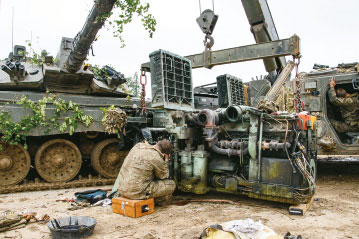 Kate Young – UK Talent Acquisition Manager, Serco UK & Europe explains how a veteran recruitment strategy can help fill the skills gap in facilities management
Kate Young – UK Talent Acquisition Manager, Serco UK & Europe explains how a veteran recruitment strategy can help fill the skills gap in facilities management
Despite just under 15,000 people leaving the UK Regular Forces during 2024, the process for transitioning military leavers into secure civilian employment is not straightforward. For us, having supported veteran recruitment for over 60 years, we understand the importance of utilising the significant number of talented ex-service members who enter the labour market annually – and, specifically how their skills and experience can be a real asset to help plug skills gaps in the facilities management industry.
Last year a RICS Facilities Management Survey found that three-quarters of participating FM businesses reported difficulties in sourcing workers for building operation and maintenance roles. Opening recruitment avenues, such as the veteran talent pool, is key to protecting the future of the FM industry, all while providing military leavers with a new and rewarding career challenge.
As one of the first companies to sign the Armed Forces Covenant, Serco now employs over 2,500 reservists and veterans, accounting for eight per cent of our workforce across the UK. In the last year alone, we’ve added over 370 to this tally, and are continuously looking to provide opportunities for veterans within our business.
We believe that employing veterans and reservists is not only the right thing to do, but also benefits the sectors we work in. Military leavers find secure employment while providing employers with sector expertise and transferable skills, which can be particularly useful for FM in industries such as defence and justice & immigration.
There are several ways employers can access the varied talent pool on offer. The first point is a relatively obvious one – the power of communication. Signalling a proactive approach to veteran recruitment can inspire ex-service members to enquire about roles and opportunities, while encouraging others to do the same. For example, we’ve developed a defence-specific recruitment landing page, encouraging applications from veterans as well as publishing real-life success stories.
One example followed Contract Manager Paul Bunnage, who now leads a team of 65 employees across three sites delivering vital satellite connections for the Ministry of Defence. In his previous career as a Marine Engineer in the Royal Navy, he was trained to have an eye for detail, compliance and process. In his new role, he’s now working to apply these skills, as well as his experience having worked on a range of naval vessels during his career and has quickly become a crucial and well-respected member of the team.
We also work closely with organisations that are already embedded in the structure of post-military life. By partnering with charities such as the Forces Transition Group, which runs online and in-person job fairs for ex-service people, we’ve been able to raise awareness of our work within the veteran community, allowing us to work closely with service leavers as they transition to civilian life. This approach enables us to get boots on the ground by attending careers fairs, directly engaging with those we’re seeking to recruit.
We’re also no stranger to the growing potential of technology and have employed an advanced AI platform to support our target of increased recruitment from this talent pool. This enables our recruitment team to proactively search for and target candidates who declare they are veterans.
FOCUS ON RETENTION
However, the work doesn’t stop at recruitment. Once an employee is successfully onboarded, the focus shifts to retention by offering military leavers a career, not just a job.
We focus on replicating the military’s collegiate culture and generating a sense of belonging, like that experienced in the forces. For example, in 2024, Serco veterans raised £20,000 across three days for the Poppy Appeal and teamed up with other Veterans Networks in North America to commemorate D-Day. For Contract Manager Paul Bunnage, this has meant an active role in promoting our Colleague Networks, including a network for military veterans, which allow a platform for voices and experiences from across our organisation to be heard and understood.
This cultural approach to retention also extends to ensuring that ex-service employees feel valued and recognised for the work that they do. To facilitate this, we introduced the Serco Veterans Awards, to recognise those both supporting and working as veterans in the business. And for Bunnage, it was his proactive attitude and invaluable skillsets from the Royal Navy that won him a nomination for the Armed Forces Veteran in Facilities Management Award.
It’s important to us that we look to support veterans beyond our organisation too. We sponsor the Ex-British Forces in Business Awards and are also a proud partner of Women in Defence UK.
The FM skills gap does present a major challenge for the sector, but there is an opportunity to lead the way in diversifying recruitment approaches that simultaneously help to alleviate veteran unemployment.





